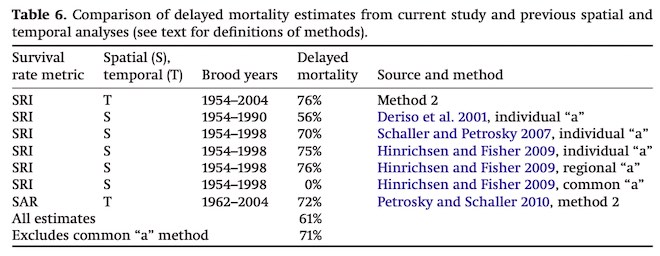forum
library
tutorial
contact

Dam Advocates Welcome
Salmon Survival Rate Study
by Matthew Weaver
Capital Press, November 6, 2020
|
the film forum library tutorial contact |

|
Dam Advocates Welcome
by Matthew Weaver
|
For advocates of dams and river transportation, the study reinforces that removing dams
and eliminating barging would be a step in the wrong direction,
 Advocates of using the Columbia-Snake river system for agricultural transportation say a new study questioning the basis for the push to breach dams will help their cause.
Advocates of using the Columbia-Snake river system for agricultural transportation say a new study questioning the basis for the push to breach dams will help their cause.
"This research casts even further doubt on the already shaky assertion that Snake River dam breaching would meaningfully assist our region's salmon recovery efforts," said Kristin Meira, executive director of the Pacific Northwest Waterways Association, a collaboration of ports, businesses and other stakeholders in the region.
Much of the overall salmon decline along the West Coast, including in Canada, can be tied to the fate of the salmon in the oceans, cyclical ocean conditions and overall declining ocean habitat, she said.
"I think it reinforces that we don't have a Snake River salmon problem or even a Columbia Basin salmon problem. We have, at a minimum, a North Pacific salmon problem," Meira said.
Research efforts should be applied to the ocean part of the salmon's life cycle with the same amount of devotion as the river part, Meira said.
For advocates of dams and river transportation, the study reinforces that removing dams and eliminating barging would be a step in the wrong direction, Meira said.
Barging is the most efficient and least carbon-intensive way to move crops and products, and alleviates pressure on other modes of transportation such as rail and roads.
She also pointed to the hydropower generated by the projects.
"It's always been a bit of a head-scratcher to us that this extremely narrow approach has been demanded by some groups in our region," she said of dam breaching.
"When you look at the wide swathes ... that these fish cover, the nature of their life cycle, we know that any one action in one area is not how you make a difference for these fish," she said. "We'd hope they recognize that fish have big problems in the ocean and we should all be at the table to talk about them."
A proponent of breaching the Snake River dams questioned the study and its author.
"What's clear is that salmon lead complicated lives -- they move from freshwater to saltwater and back again," said Joseph Bogaard, executive director of Save Our Wild Salmon, an environmental coalition. "As a result, there's multiple causes of decline. The condition of the ocean is a factor in salmon survival in any given year."
The Save Our Wild Salmon coalition is primarily focused on restoring harvestable, healthy salmon populations to the Columbia-Snake system, Bogaard said. Humans have the greatest impact, and ability to manage that impact, in the freshwater system, he said.
The organization advocates removing the Ice Harbor, Lower Monumental, Little Goose and Lower Granite dams on the Snake River.
"Recovery of those fish populations is unlikely to occur, and extinction is likely to occur with those four dams in place," Bogaard said. "Science has built up over 20 years consistently showing the same thing."
Bogaard questioned study author David Welch's funding by a consultant of Bonneville Utilities, which Bogaard said raises questions about "independence." He also questioned Welch's methods and conclusions on previous salmon studies.
"I don't think (Welch) will have the last word here," he said.
Related Pages:
A synthesis of the coast-wide decline in survival of West Coast Chinook Salmon by David Welch, Aswea Porter, Erin Rechisky, Fish and Fisheries, September 17, 2020
learn more on topics covered in the film
see the video
read the script
learn the songs
discussion forum
